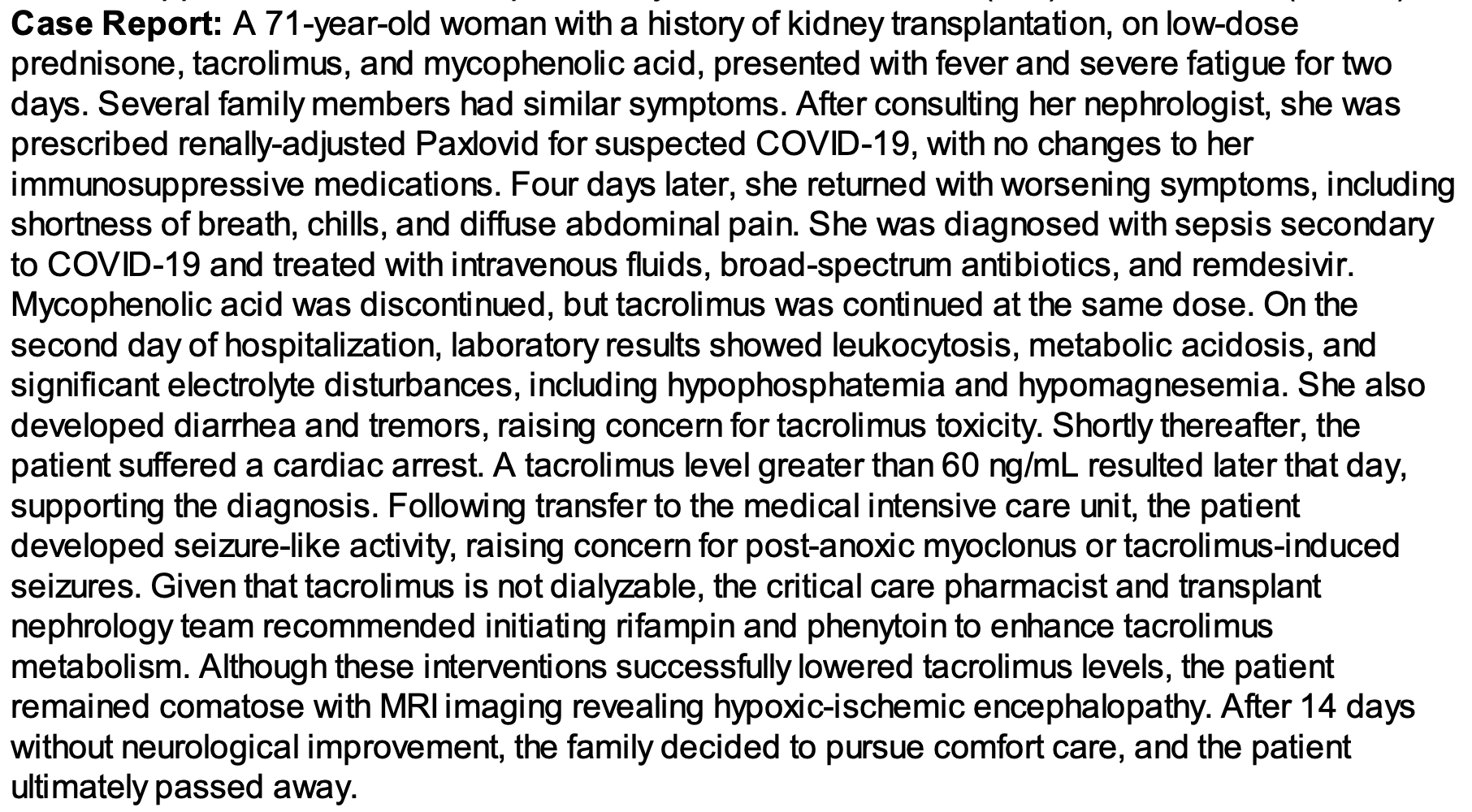
Toxic as FK - A Case of Paxlovid-Induced Tacrolimus (FK506) Toxicity in a Kidney Transplant Recipient with COVID-19
et al., American Journal of Respiratory and Critical Care Medicine, doi:10.1164/ajrccm.2025.211.Abstracts.A1193, May 2025
Case report of a 71-year-old kidney transplant recipient who developed fatal tacrolimus toxicity after being prescribed paxlovid for COVID-19.
Leitch-Casey et al., 31 May 2025, peer-reviewed, 5 authors.
Contact: lleitch3@hfhs.org.
Building, Level 2), Moscone Center
Introduction: The COVID-19 pandemic has posed significant challenges to solid organ transplantation, complicating the management of transplant recipients. Patients on immunosuppressive therapy are especially vulnerable to COVID-19 which, if not addressed promptly, can increase morbidity and mortality. The introduction of oral antiviral treatments, such as nirmatrelvir-ritonavir (Paxlovid), has improved access to COVID-19 therapies. However, these agents also increase the risk of drug interactions, which may amplify the toxicities of immunosuppressive medications, particularly calcineurin inhibitors (CNI) like tacrolimus (FK506). Case Report: A 71-year-old woman with a history of kidney transplantation, on low-dose prednisone, tacrolimus, and mycophenolic acid, presented with fever and severe fatigue for two days. Several family members had similar symptoms. After consulting her nephrologist, she was prescribed renally-adjusted Paxlovid for suspected COVID-19, with no changes to her immunosuppressive medications. Four days later, she returned with worsening symptoms, including shortness of breath, chills, and diffuse abdominal pain. She was diagnosed with sepsis secondary to COVID-19 and treated with intravenous fluids, broad-spectrum antibiotics, and remdesivir. Mycophenolic acid was discontinued, but tacrolimus was continued at the same dose. On the second day of hospitalization, laboratory results showed leukocytosis, metabolic acidosis, and significant electrolyte disturbances, including hypophosphatemia and hypomagnesemia. She also developed diarrhea and tremors, raising concern for tacrolimus toxicity. Shortly thereafter, the patient suffered a cardiac arrest. A tacrolimus level greater than 60 ng/mL resulted later that day, supporting the diagnosis. Following transfer to the medical intensive care unit, the patient developed seizure-like activity, raising concern for post-anoxic myoclonus or tacrolimus-induced seizures. Given that tacrolimus is not dialyzable, the critical care pharmacist and transplant nephrology team recommended initiating rifampin and phenytoin to enhance tacrolimus metabolism. Although these interventions successfully lowered tacrolimus levels, the patient remained comatose with MRI imaging revealing hypoxic-ischemic encephalopathy. After 14 days without neurological improvement, the family decided to pursue comfort care, and the patient ultimately passed away. Discussion: This case emphasizes the importance of caution when prescribing Paxlovid and other CYP3A4-inhibiting drugs to transplant recipients on immunosuppressive therapy. The interaction between ritonavir, a potent CYP3A4 inhibitor, and tacrolimus highlights the need for comprehensive, multidisciplinary management, including close collaboration with transplant specialists and pharmacists. Frequent monitoring of tacrolimus levels and timely recognition of toxicity are crucial to mitigate risks in this vulnerable population. Given the increasing use of CYP3A4..
DOI record:
{
"DOI": "10.1164/ajrccm.2025.211.abstracts.a1193",
"ISSN": [
"1073-449X",
"1535-4970"
],
"URL": "http://dx.doi.org/10.1164/ajrccm.2025.211.Abstracts.A1193",
"alternative-id": [
"10.1164/ajrccm.2025.211.Abstracts.A1193"
],
"assertion": [
{
"group": {
"label": "Publication History",
"name": "publication_history"
},
"label": "Published",
"name": "published",
"order": 3,
"value": "2025-05-01"
}
],
"author": [
{
"affiliation": [
{
"name": "Internal Medicine, Henry Ford St. John Hospital, Detroit, MI, United States"
}
],
"family": "Leitch-Casey",
"given": "L.",
"sequence": "first"
},
{
"affiliation": [
{
"name": "Internal Medicine, Henry Ford St. John Hospital, Detroit, MI, United States"
}
],
"family": "Behbahani-Nejad",
"given": "N.",
"sequence": "additional"
},
{
"affiliation": [
{
"name": "Pulmonary, Critical Care and Sleep Medicine, Henry Ford St. John Hospital, Detroit, MI, United States"
}
],
"family": "Gidda",
"given": "H.",
"sequence": "additional"
},
{
"affiliation": [
{
"name": "Pharmacy, Henry Ford St. John Hospital, Detroit, MI, United States"
}
],
"family": "Ng",
"given": "T.H.",
"sequence": "additional"
},
{
"affiliation": [
{
"name": "Pulmonary, Critical Care and Sleep Medicine, Henry Ford St. John Hospital, Detroit, MI, United States"
}
],
"family": "Franco-Elizondo",
"given": "R.",
"sequence": "additional"
}
],
"container-title": "American Journal of Respiratory and Critical Care Medicine",
"container-title-short": "Am J Respir Crit Care Med",
"content-domain": {
"crossmark-restriction": true,
"domain": [
"www.atsjournals.org"
]
},
"created": {
"date-parts": [
[
2025,
5,
11
]
],
"date-time": "2025-05-11T12:26:17Z",
"timestamp": 1746966377000
},
"deposited": {
"date-parts": [
[
2025,
5,
11
]
],
"date-time": "2025-05-11T13:19:09Z",
"timestamp": 1746969549000
},
"indexed": {
"date-parts": [
[
2025,
5,
11
]
],
"date-time": "2025-05-11T13:40:06Z",
"timestamp": 1746970806811,
"version": "3.40.5"
},
"is-referenced-by-count": 0,
"issue": "Abstracts",
"issued": {
"date-parts": [
[
2025,
5
]
]
},
"journal-issue": {
"issue": "Abstracts",
"published-print": {
"date-parts": [
[
2025,
5
]
]
}
},
"language": "en",
"link": [
{
"URL": "https://www.atsjournals.org/doi/pdf/10.1164/ajrccm.2025.211.Abstracts.A1193",
"content-type": "unspecified",
"content-version": "vor",
"intended-application": "similarity-checking"
}
],
"member": "19",
"original-title": [],
"page": "A1193-A1193",
"prefix": "10.1164",
"published": {
"date-parts": [
[
2025,
5
]
]
},
"published-print": {
"date-parts": [
[
2025,
5
]
]
},
"publisher": "American Thoracic Society",
"reference-count": 0,
"references-count": 0,
"relation": {},
"resource": {
"primary": {
"URL": "https://www.atsjournals.org/doi/10.1164/ajrccm.2025.211.Abstracts.A1193"
}
},
"score": 1,
"short-title": [],
"source": "Crossref",
"subject": [],
"subtitle": [],
"title": "Toxic as FK - A Case of Paxlovid-Induced Tacrolimus (FK506) Toxicity in a Kidney Transplant Recipient with COVID-19",
"type": "journal-article",
"update-policy": "https://doi.org/10.1164/crossmarkpolicies",
"volume": "211"
}